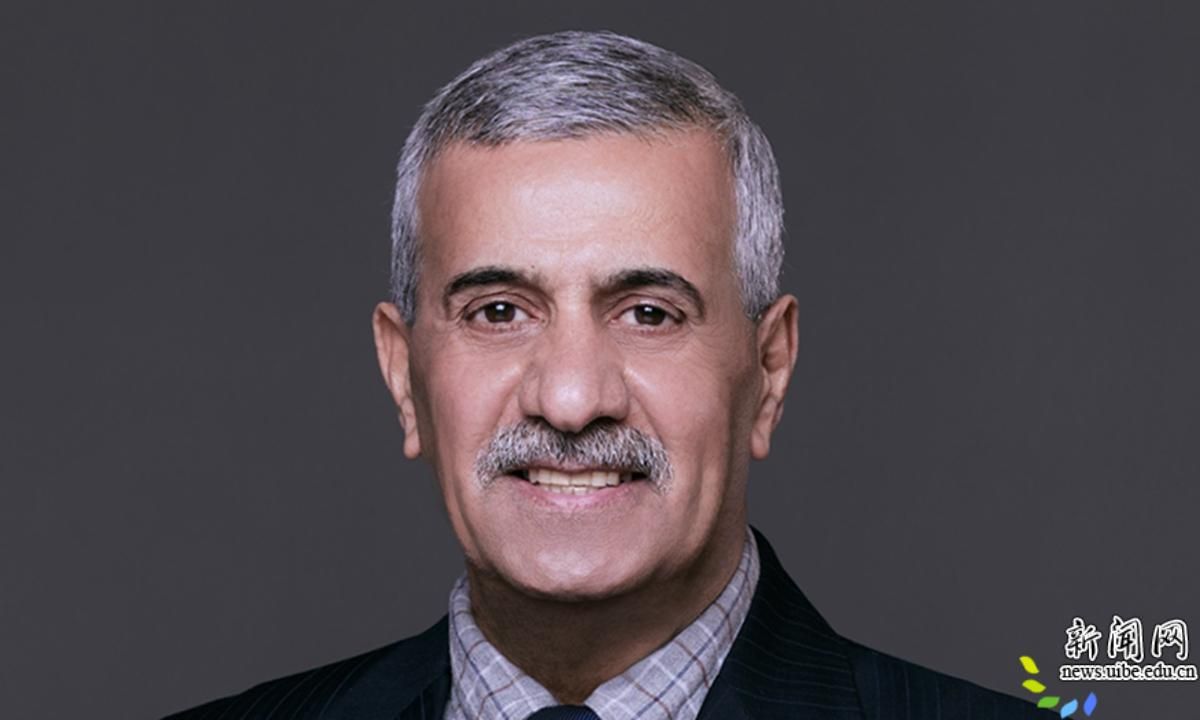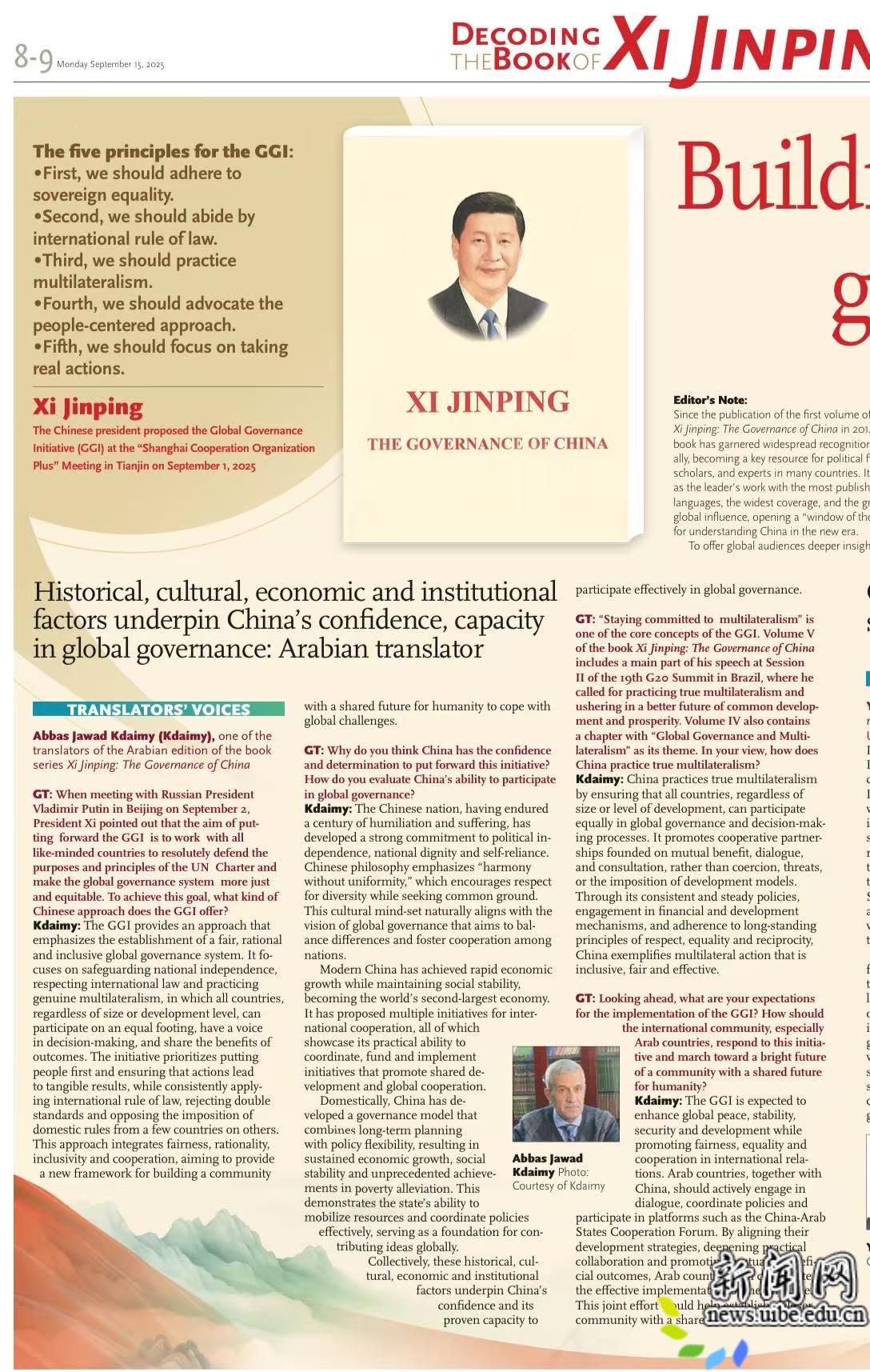(来源:GLOBAL TIMES 2025-09-14)

Abbas Jawad Kdaimy Photo: Courtesy of Kdaimy
Editor's Note:
Chinese President Xi Jinping proposed the Global Governance Initiative (GGI) at the "Shanghai Cooperation Organization Plus" Meeting held in North China's Tianjin on September 1. This is another important public good that China has provided to the international community, following the Global Development Initiative, the Global Security Initiative and the Global Civilization Initiative. This important initiative points the way forward and provides a practical path for the reform and development of the global governance system, injecting strong impetus into promoting the building of a more just and equitable global governance system and working together for a community with a shared future for humanity.
In October 2015, President Xi put forward the global governance vision of extensive consultation and joint contribution for shared benefit. A number of important speeches included in the book series Xi Jinping: The Governance of China reflect President Xi's ideas for promoting reform and improvement of global governance. One of the speeches was delivered at the 19th G20 Summit in Brazil in November 2024, where he once again called for working for a just and equitable global governance system. He also advanced concepts and ideas to improve global governance in the economic, financial, trade, digital and ecological fields, contributing Chinese wisdom and strength to improving the global governance system and opening up a better future for the world.
In the 12th installment of the special series "Decoding the Book of Xi Jinping: The Governance of China," the Global Times, along with People's Daily Overseas Edition, continues to invite Chinese and foreign scholars, translators of Xi's works, practitioners with firsthand experience and international readers to discuss the theme of "promoting the building of a more just and equitable global governance system and working together for a community with a shared future for humanity," in a bid to explore in depth the significant contemporary value and global importance of the GGI.
In the 12th article of the "Translators' Voices" column, the Global Times (GT) interviewed Abbas Jawad Kdaimy (Kdaimy), one of the translators of the Arabian edition of the book series Xi Jinping: The Governance of China.
GT: When meeting with Russian President Vladimir Putin in Beijing on September 2, President Xi pointed out that the aim of putting forward the GGI is to work with all like-minded countries to resolutely defend the purposes and principles of the UN Charter and make the global governance system more just and equitable. To achieve this goal, what kind of Chinese approach does the GGI offer? What implications does it have for the world in jointly responding to global challenges?
Kdaimy: The GGI provides an approach that emphasizes the establishment of a fair, rational and inclusive global governance system. It focuses on safeguarding national independence, respecting international law and practicing genuine multilateralism, in which all countries, regardless of size or development level, can participate on an equal footing, have a voice in decision-making, and share the benefits of outcomes. The initiative prioritizes putting people first and ensuring that actions lead to tangible results, while consistently applying international rule of law, rejecting double standards and opposing the imposition of domestic rules from a few countries on others. This approach integrates fairness, rationality, inclusivity and cooperation, aiming to provide a new framework for building a community with a shared future for humanity to cope with global challenges.
GT: Why do you think China has the confidence and determination to put forward this initiative? How do you evaluate China's ability to participate in global governance?
Kdaimy: China's confidence and determination to propose the GGI are rooted in its historical experience, cultural heritage, development achievements and systematic advantages. The Chinese nation, having endured a century of humiliation and suffering, has developed a strong commitment to political independence, national dignity and self-reliance. Chinese philosophy emphasizes "harmony without uniformity," which encourages respect for diversity while seeking common ground. This cultural mind-set naturally aligns with the vision of global governance that aims to balance differences and foster cooperation among nations.
Modern China has achieved rapid economic growth while maintaining social stability, becoming the world's second-largest economy. It has proposed multiple initiatives for international cooperation, such as the Belt and Road Initiative (BRI) and the Asian Infrastructure Investment Bank (AIIB), and engaged in development projects under the SCO and regional investment partnerships, all of which showcase its practical ability to coordinate, fund and implement initiatives that promote shared development and global cooperation.
Domestically, China has developed a governance model that combines long-term planning with policy flexibility, resulting in sustained economic growth, social stability and unprecedented achievements in poverty alleviation. This demonstrates the state's ability to mobilize resources and coordinate policies effectively, serving as a foundation for contributing ideas globally.
Collectively, these historical, cultural, economic and institutional factors underpin China's confidence and its proven capacity to participate effectively in global governance.
GT: The GGI is another major initiative proposed by China, following the Global Development Initiative (GDI), the Global Security Initiative (GSI) and the Global Civilization Initiative (GCI). The GDI focuses on promoting international development cooperation, the GSI aims to resolve international disputes through dialogue and consultation, the GCI strives to promote exchanges and mutual learning among civilizations, and the GGI anchors the direction, principles and path for reforming global governance systems and mechanisms. What internal connections and synergies do you see between the GGI and the previous three initiatives?
Kdaimy: The GGI is closely interconnected with the GDI, GSI and GCI, forming a coherent framework for China's global engagement. Together, these initiatives reinforce each other: development projects require governance structures for fair distribution and sustainability; security cooperation depends on sound governance and the rule of law; and civilizational exchanges benefit from inclusive, multilateral systems. All four initiatives share a commitment to equality, mutual benefit, respect for sovereignty, peaceful coexistence and joint responses to global challenges, reflecting a unified philosophy of advancing humanity's collective security, prosperity and cultural harmony.
GT: What public goods or practices provided by China have impressed you and given you a deeper understanding and appreciation of China's global governance philosophy? How have these practices promoted common development and enhanced the well-being of their people?
Kdaimy: Several concrete examples illustrate how these initiatives promote development and well-being. For instance, infrastructure projects such as the China-Kyrgyzstan-Uzbekistan railway and the China-Pakistan Economic Corridor are being advanced. Cambodia's special economic zone, funded by Chinese investments, attract hundreds of enterprises, and 21 economic and trade cooperation zones have been established in SCO member states. These initiatives have generated local employment, increased tax revenues and strengthened regional connectivity. Financial mechanisms supporting these projects include the AIIB - a multilateral financial institution proposed by China, with 110 members worldwide now - that is dedicated to environmentally friendly and technologically advanced projects.
Additionally, at the 2025 SCO Summit, China announced that it will provide 2 billion yuan ($281 million) in grant to other SCO member states this year, and issue an additional 10 billion yuan in loans to the member banks of the SCO Interbank Consortium over the next three years, further promoting shared growth and capacity building.
These examples demonstrate that China's initiatives combine financial, technological and cooperative resources to achieve tangible outcomes, enhancing regional development, employment and prosperity while fostering interconnectivity and trust among nations.
GT: "Staying committed to multilateralism" is one of the core concepts of the GGI. Volume V of the book Xi Jinping: The Governance of China includes a main part of his speech at Session II of the 19th G20 Summit in Brazil, where he called for practicing true multilateralism and ushering in a better future of common development and prosperity. Volume IV also contains a chapter with "Global Governance and Multilateralism" as its theme. In your view, how does China practice true multilateralism?
Kdaimy: China is a founder of the UN, a permanent member of the UN Security Council and has diplomatic relations with the vast majority of UN member states. It is one of the countries with the largest number of diplomatic missions in the world.
China is a member of almost all universal intergovernmental organizations, and maintains partnerships and cooperation with development-oriented financial organizations and institutions worldwide. China is a founding member of BRICS and the SCO, and is also a member of the G20.
China practices true multilateralism by ensuring that all countries, regardless of size or level of development, can participate equally in global governance and decision-making processes. It promotes cooperative partnerships founded on mutual benefit, dialogue, and consultation, rather than coercion, threats, or the imposition of development models. Through its consistent and steady policies, engagement in financial and development mechanisms like the AIIB and BRI, and adherence to long-standing principles of respect, equality and reciprocity, China exemplifies multilateral action that is inclusive, fair and effective.
GT: Looking ahead, what are your expectations for the implementation of the GGI? How should the international community, especially Arab countries, respond to this initiative and march toward a bright future of a community with a shared future for humanity?
Kdaimy: Looking forward, the GGI is expected to enhance global peace, stability, security and development while promoting fairness, equality and cooperation in international relations. It provides a framework for implementing the principles of multilateralism, shared responsibility and respect for international law, ensuring that the benefits of governance and development are distributed equitably.
Arab countries, together with China, should actively engage in dialogue, coordinate policies and participate in platforms such as the China-Arab States Cooperation Forum. By aligning their development strategies, deepening practical collaboration and promoting mutually beneficial outcomes, Arab countries can contribute to the effective implementation of the initiative. This joint effort would help establish a closer community with a shared future for humanity.

附原文链接:https://enapp.globaltimes.cn/article/1343449